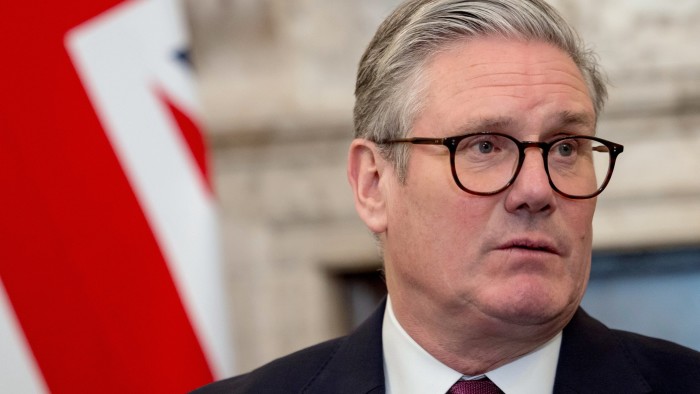Unlock the White House Watch newsletter for free
Your guide to what the 2024 US election means for Washington and the world
Sir Keir Starmer will on Tuesday tell his cabinet to prepare for the imposition of US tariffs on British exports this week, with business and trade secretary Jonathan Reynolds warning it was “a very serious and significant moment” for the UK.
Downing Street has conceded it is almost certain that US President Donald Trump will include Britain in a new wave of reciprocal global tariffs on Wednesday, with potentially far-reaching consequences for the British economy.
Starmer still hopes Britain can secure a trade deal with the US to mitigate the impact of the tariffs, but weeks of trade talks and diplomatic courtship of the president have failed to produce a result.
Ministers are now drawing up plans to mitigate the fallout of a global trade war.
Reynolds said on Tuesday that Britain would put in place anti-dumping measures to stop Britain being flooded with cheap goods diverted from the US market.
Meanwhile, chancellor Rachel Reeves has been warned by the Office for Budget Responsibility that her fiscal headroom of £9.9bn could be almost obliterated if Trump unleashes a full-scale trade war.
Lord Peter Mandelson, the UK’s envoy to Washington, held last-minute talks with US officials in the White House on Monday, and Downing Street said discussions would continue beyond the expected introduction of tariffs on Wednesday, which Trump is calling “Liberation Day”.
But Reynolds on Tuesday conceded that it was likely that Britain — similarly to the rest of the world — was about to be hit by new Trump tariffs.
“It might not be possible for any country in the world to be exempt from the initial announcements,” Reynolds said, but added that Britain would continue to pursue a trade deal with the US.
“It’s not about sucking up to anyone or not responding — it’s about pursuing our national interest,” he said, arguing that British business was not pressing for the UK to impose immediate reciprocal tariffs.
Unlike Canada or the EU, Starmer has rejected retaliatory tariffs for now, hoping Trump can be persuaded that Britain, which has a balanced trading relationship with the US, should get a special deal.
Britain has offered to scale back or scrap its digital services tax, which raises about £800mn a year and mainly affects US tech groups, as part of a proposed deal.
Reynolds denied that US concerns about free speech in Britain had played any part in trade talks, saying that such worries were being expressed by the state department rather than trade negotiators.
But he told the BBC: “It’s a very serious and significant moment. That’s why we have been so resolute in pursuing our national interest and putting the UK in the best place of any country to navigate some of these pressures.”
He said he was ready to impose quotas and tariffs on certain products to protect British companies from the dumping of heavily discounted products that had been destined for the US.
Britain already had in place quotas and 25 per cent tariffs on some steel and aluminium products, following Trump’s earlier announcement of US levies on the sector, Reynolds added.
He said he would apply the same principle in future as Trump widens his tariff net to “ensure we’re not on the receiving end of dumping”. However, he admitted there would inevitably be “an impact from that kind of activity”.
Although business broadly backs Starmer’s “cool-headed” approach to the threat of tariffs, the prime minister will face political heat — particularly from the anti-Trump Liberal Democrats — for attempting to curry favour with the US president while so far getting little in return.




